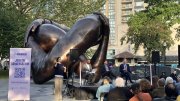On Arts First weekend, poet Maxine Kumin ’46, A.M. ’48, a Bunting Institute Fellow in 1963, became the eleventh recipient of the Harvard Arts Medal. Kumin has published 15 volumes of poetry, and received the Pulitzer Prize for Up Country: Poems of New England (1972). Her comments come from a public conversation that she held with fellow poet Jorie Graham, Boylston professor of rhetoric and oratory, at the Barker Center for the Humanities on May 6.
“Nobody plans to become a poetand if they do, they are certainly deluded. You become a poet because you are obsessed.”
“Writing free verse is a much more difficult proposition. I feel like I’m in Indiana with my eyelids pinned open and I can see 360 degrees. I don’t know where the line should break.”
Maxine Kumin Photograph by Kris Snibbe / Harvard News Office “Writing light verse, you have to close the door at the end of the poem.”
“The audience for poetry is now broader, more intense, and more open. You could count on your two hands the number of poetry books published each year from 1961 to 1970.”
“We’re awash in poetry and it doesn’t matter that it isn’t all good. A hundred years from now that will sort itself out.”
“Writing on the computer can make you very glib. It would be better to write the first draft in pen and ink. It’s very squashy on the computer, so easy to change lines.”
“You have to bring a whole lot more to a poem than to any other art form. You can’t be a passive observer.”
“I am no good for writing after four o’clock, especially if there is a ball game coming.”






